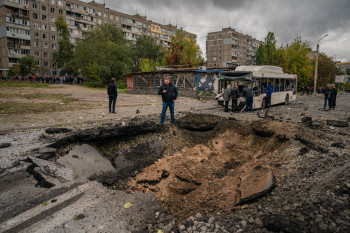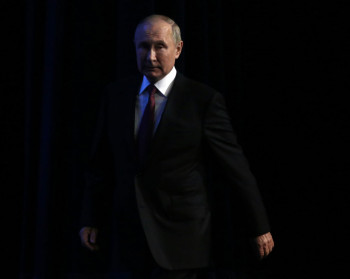Could mobilization, battlefield defeats cost Putin his regime?
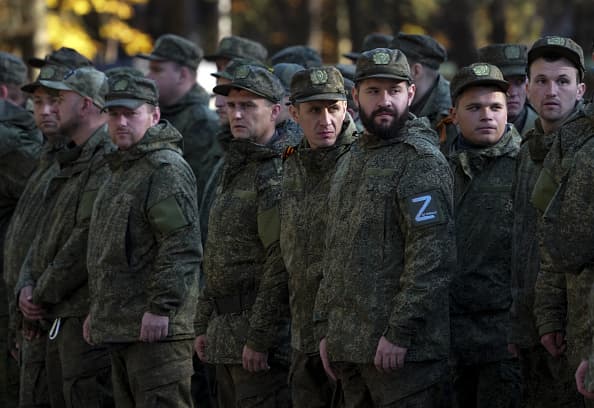
Russian dictator Vladimir Putin has raised the stakes in his war against Ukraine, and he may be paying the price.
By announcing the mobilization of conscripts on Sept. 21 and the illegal annexation of more Ukrainian territory on Sept. 30, he increased domestic instability in Russia.
People who were content to watch the invasion as a reality show on television are reluctant to wage war and risk being killed. Others are disappointed with Russia's repeated defeats during Ukrainian counter-offensives in Kherson, Kharkiv, Luhansk, and Donetsk oblasts.
As a result, public discontent is growing, and fewer people are happy about Putin's leadership.
Russia's illegal and unrecognized annexation of Ukraine's Kherson, Zaporizhzhia, Donetsk, and Luhansk oblasts, which Russia has partly occupied, is also seen as a watershed moment that solidified the country's status as a pariah state.
Yet opinions differ on Russia's further prospects.
Some predict that a coup d'etat against Putin is more likely than ever. Others argue that Putin's regime is stable enough to crush dissent and prevent a coup or an uprising.
read also
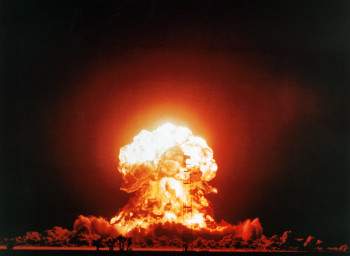
Mobilization backfires
The Russian authorities claimed that the mobilization was “partial” and envisaged multiple exemptions.
In reality, military enlistment offices have arbitrarily drafted those who have not served in the army and have no military experience, people with disabilities, those with severe diseases, and fathers with many children – who are supposed to be exempt.
Mobilized conscripts have been forced to buy uniforms and equipment at their own expense, and some conscripts have been sent to the front line without proper training.
"Mistakes" made during the mobilization have been admitted by Russian top officials and propagandists, as well as by Putin himself.
"They're infuriating people, as if on purpose, as if out of spite. As if Kyiv had sent them," the pro-Kremlin editor of Russia's state-run RT network, Margarita Simonyan, said on Sept. 24.
Instability mounts
Putin's decision to announce mobilization for the war against Ukraine contributed to political and social instability.
Before the mobilization, there was an informal pact between the Kremlin and the Russian population – society renounced their rights and civil liberties, but the Kremlin generally left them alone as long as they didn't enter politics, according to a view popular among Russian political analysts.
This opinion is shared, among others, by analyst Fyodor Krasheninnikov and human rights activist Marina Litvinovich.
The mobilization destroyed this pact by involving a major part of the population in a war, Krasheninnikov and Litvinovich believe.
According to a survey conducted by Levada, a Russian polling agency deemed independent, the share of those who approve of Putin's performance dropped from 83% in August to 77% in September.
Protests against the mobilization have taken place all over Russia.
The most large-scale protests took place in the republic of Dagestan in Russia's North Caucasus. Protesters clashed with the police and blocked a highway.
Demonstrations against the mobilization were held even in Chechnya, where dissent has always been stifled.
Chechen strongman Ramzan Kadyrov had to announce that there would be no mobilization in Chechnya, arguing that the republic had already sent enough volunteer fighters to Ukraine since Feb. 24.
Meanwhile, about two dozen military enlistment offices in Russia have been set on fire since the mobilization was announced. On Sept. 26, a local resident shot and wounded a military enlistment officer in Ust-Ilimsk, Irkutsk Oblast.
Wave of emigration
The mobilization also prompted one of the biggest waves of emigration in Russia's recent history, with hundreds of thousands of conscription-age men fleeing the country.
Forbes Russia reported on Oct. 4, citing sources close to Russia's Presidential Administration, that 700,000 people had left Russia since the mobilization began.
As a result of the mobilization, thousands of men fleeing mobilization created multi-kilometer lines on the Russian-Georgian border. The Russian authorities responded by setting up makeshift military enlistment offices on the border.
The brain drain caused by the mobilization and the cut in the workforce due to the draft will also aggravate the economic problems of Russia, which is already suffering from unprecedented economic sanctions, according to an analysis by Bloomberg.
Is the mobilization campaign going well?
There have been predictions that the mobilization would fail in Russia due to the number of those dodging the draft and the bureaucratic machine's ineffectiveness.
However, so far, the mobilization appears to be working.
Russian Defense Minister Sergei Shoigu said on Sept. 21 that 300,000 would be mobilized.
According to the Conflict Intelligence Team, an open-source intelligence outfit, at least 213,200 people had been mobilized by Oct. 5.
Independent Russian news outlets Novaya Gazeta.Europe and Meduza reported in September, citing their sources, that a secret clause in Putin’s mobilization decree envisages mobilizing around 1 million people. The Kremlin has denied this report.
Sergei Sazonov, a Russian-born political philosopher at Estonia's Tartu University, argued that there is a great fear of the state in the Russian mentality, and conscripts from small towns and villages have few resources to evade the draft.
"They don't realize how likely they are to die," he told the Kyiv Independent.
Sazonov compared the current situation to the Soviet Union in 1941 when it managed to successfully carry out the mobilization of conscripts despite the effective destruction of its army by Nazi Germany.
But one aspect of total warfare that Russia still lacks is the mobilization of the economy, Sazonov said. The lack of economic mobilization will make it harder for Russia to produce enough weapons and equip its troops.
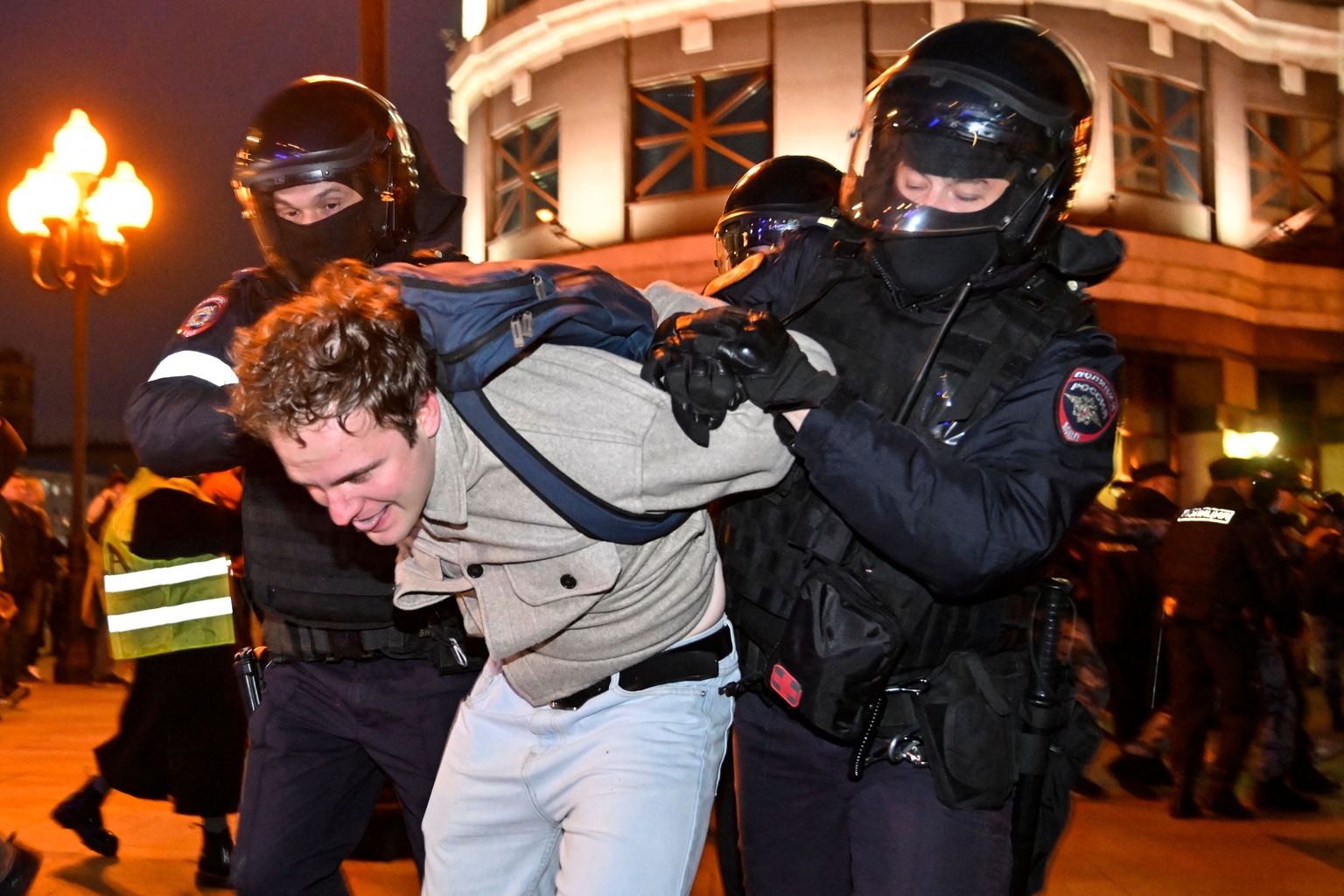
Coup or uprising?
As Russia is suffering defeats on the front line and as disaffection with mobilization is growing, instability in Russia is mounting. Just like after the start of the full-scale war in February, speculation has reappeared that Putin may be overthrown in a coup d'etat.
Russian political analyst Dmitry Oreshkin believes that a coup is possible.
But Putin is more likely to be overthrown by pro-war imperialists, not those who want to end the war and seek a rapprochement with the West, Oreshkin told the Kyiv Independent.
"A struggle is taking place at the pilothouse of a sinking Titanic," he added.
The most outspoken leaders of the "hawk" party in Russia are Chechen strongman Kadyrov, Yevgeny Prigozhin, the leader of the private military company Wagner Group, and Igor Strelkov, a warlord who played a major role in launching Russia's war against Ukraine in 2014.
They have criticized Russia's military leadership for defeats and concessions.
Sazonov believes, however, that a coup is highly unlikely.
"Putin's regime is very stable," he said. "His opponents don't have a serious political base."
Sazonov said that Putin is protected by the Federal Protective Service (FSO), which is highly professional, and it would be hard for potential plotters to break through his security.
Both Oreshkin and Sazonov argued that a popular uprising is unlikely in Russia because Putin's regime would easily suppress any protests, and there is no organized opposition.
Selling the defeat
Even if Putin loses the war, he may still be able to use his propaganda machine to explain the defeat and stay in power.
"Saddam Hussein lost the war but kept power," Sazonov said.
Oreshkin compared this situation to Stalin getting away with his de facto defeat in the Winter War with Finland in 1940.
"Putin controls law enforcement and the media," he said. "He can sell whatever he wants to the population."
Now repression is aimed against the anti-war movement, but in case of defeat, there will be repression against the hawks, Oreshkin said.
"To maintain control, he'll have to destroy the pro-war party," he added.

